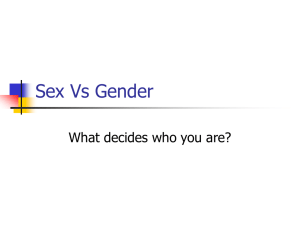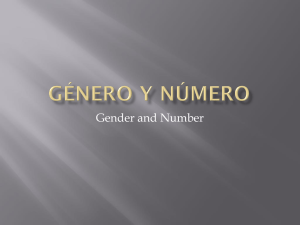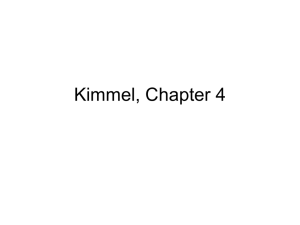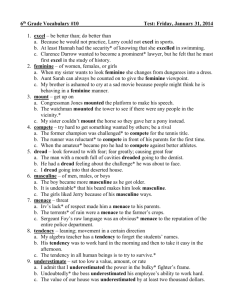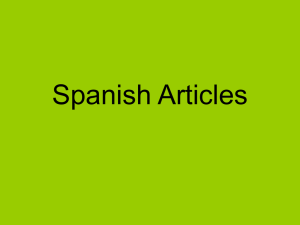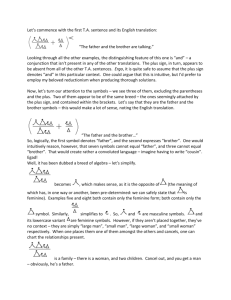A Gender Agenda - Royal Holloway
advertisement
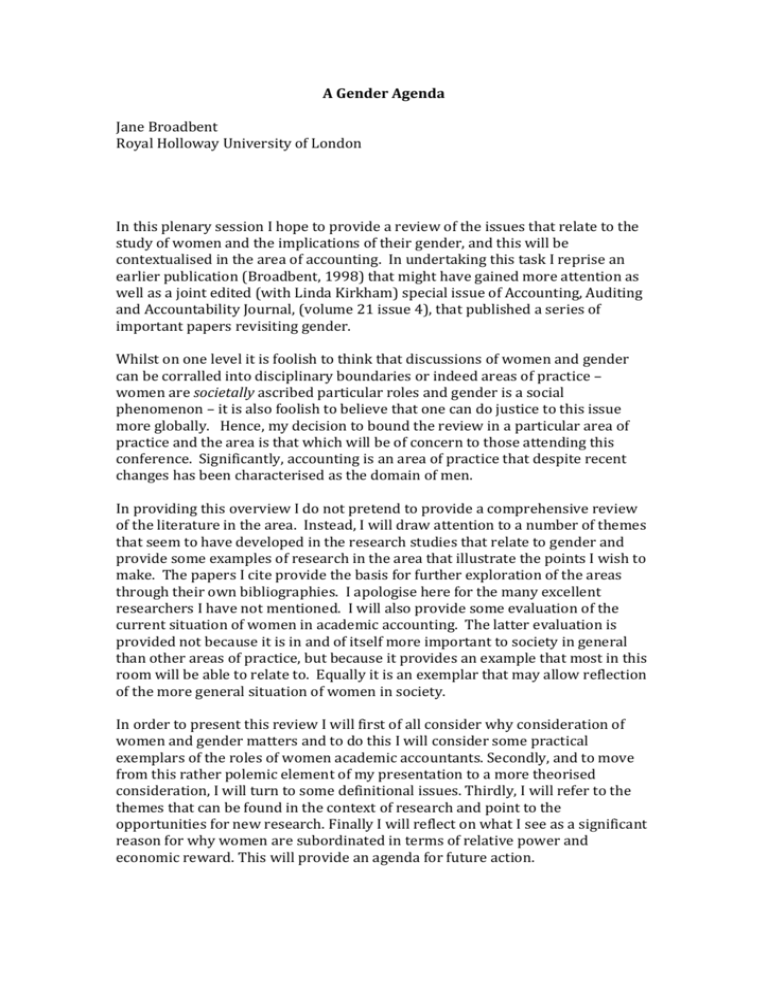
A Gender Agenda Jane Broadbent Royal Holloway University of London In this plenary session I hope to provide a review of the issues that relate to the study of women and the implications of their gender, and this will be contextualised in the area of accounting. In undertaking this task I reprise an earlier publication (Broadbent, 1998) that might have gained more attention as well as a joint edited (with Linda Kirkham) special issue of Accounting, Auditing and Accountability Journal, (volume 21 issue 4), that published a series of important papers revisiting gender. Whilst on one level it is foolish to think that discussions of women and gender can be corralled into disciplinary boundaries or indeed areas of practice – women are societally ascribed particular roles and gender is a social phenomenon – it is also foolish to believe that one can do justice to this issue more globally. Hence, my decision to bound the review in a particular area of practice and the area is that which will be of concern to those attending this conference. Significantly, accounting is an area of practice that despite recent changes has been characterised as the domain of men. In providing this overview I do not pretend to provide a comprehensive review of the literature in the area. Instead, I will draw attention to a number of themes that seem to have developed in the research studies that relate to gender and provide some examples of research in the area that illustrate the points I wish to make. The papers I cite provide the basis for further exploration of the areas through their own bibliographies. I apologise here for the many excellent researchers I have not mentioned. I will also provide some evaluation of the current situation of women in academic accounting. The latter evaluation is provided not because it is in and of itself more important to society in general than other areas of practice, but because it provides an example that most in this room will be able to relate to. Equally it is an exemplar that may allow reflection of the more general situation of women in society. In order to present this review I will first of all consider why consideration of women and gender matters and to do this I will consider some practical exemplars of the roles of women academic accountants. Secondly, and to move from this rather polemic element of my presentation to a more theorised consideration, I will turn to some definitional issues. Thirdly, I will refer to the themes that can be found in the context of research and point to the opportunities for new research. Finally I will reflect on what I see as a significant reason for why women are subordinated in terms of relative power and economic reward. This will provide an agenda for future action. Why does research relating to women and gender matter? In this part of my presentation I will motivate my presentation and consider the position of women in the profession as a whole and in particular on that sub-set of the profession that is academic accounting. I have said elsewhere and often, that in the context of my life the engagement of women in the profession has changed considerably and the representation of women has been transformed at the lower levels of seniority. Despite this women remain under-represented at the very senior levels of professional firms and in senior positions in the academy. Some have argued that the trickle down effect will change this position in due course, but I currently remain pessimistic. There is little evidence from research to show that we are likely to see equal numbers of men and women in the most senior roles for many years and there is also evidence that when women reach senior levels they do so in particular sectors or in less desirable situations (the glass cliff syndrome) (Nutley and Mudd, 2005). It follows that an over-riding motivation for this plenary presentation is that after 27 years as an academic accountant (and over 45 as an accountant) I still get angry about the position of women in general and in academe in particular. If we see universities in the developed world as places where intellectual leadership is built through study, research and scholarship we might expect to see enlightened attitudes and we might hope that they are bastions of equality and diversity. This is clearly not the situation; positions of power are still dominated by a cohort of white middle class men. Attitudes still are geared to expectations of the ‘great man’ and women make the tea! Let me give a few personal examples. None of these are I believe intentional but reflect indirect discrimination and taken for granted assumptions. 1. Women are always support staff. When senior vice principal at Royal Holloway I was sitting in my office when members of an interview panel walked passed my open door. I asked a junior colleague who had chaired the panel whether they had appointed and he replied in the affirmative. The external assessor walking with him then smiled at me and asked if it was possible for him to have a cab to the station. I smiled back and told him yes and that my colleague would order it for him… 2. Women are always an accompaniment not the main course. On a recent academic trip Richard and I visited two Universities. As is usually the case we were provided with offices and as is usually the case I got the ones without the windows, whilst Richard was seated in a larger office, always the one with windows. Richard of course writes all our papers… or is perceived to and I am simply along for the trip. 3. Women are house-keepers and mothers. This third example is more generalisable. Try working out the gender ratio of post holders in pastoral care roles such as student tutoring roles – in Royal Holloway I was in charge of HR strategy and was responsible for issues of diversity and equality. It follows that issues such as ‘who does what to whom’ was an important element of my role. In pastoral care roles the gender ratio was 50:50 whereas the ratio of men to women in the university overall was 70:30. In the research admin roles – those attached to areas of higher esteem - the gender ratio was the same as the overall ratio, at 70:30. Changing this pattern seemed to be near impossible (as indeed was the task of finding women to apply for jobs to make the overall ratio of academic staff 50:50). But in terms of promotion, house-keeping roles are not valued as highly as external facing roles and research and in the context of promotions this structural disadvantage is problematic. On the face of it some of these issues are minor and even raising them seems to make women (me) appear thin-skinned and petty – I even wondered about including them in this presentation. However, like those who argue that the basis of a safe community lies in keeping litter down and petty crime attended to, I feel that keeping petty everyday discrimination in check is the key to dealing with the bigger issues. Thus, I would like to suggest that these minor yet persistent elements feed into the more structural issues leading to direct discrimination and that these are likely to manifest themselves in hiring and promotion decisions. There are many examples of structural issues providing indirect discrimination, for example, and let us get local, in Italy the strictures against members of the same family working together are unhelpful when two academics are partners. This forces decisions about who goes where and forces decisions on whose career might take precedence. Linked to this is the problem of the timing of when recruitment to faculty takes place – after a PhD and then a post doc and thus often at the age when couples might be thinking of having a family. It is of course the woman who carries the child and this is likely to create some pressure about how to manage a career and a family. The expectations of man as bread-winner remain strong and the expectations on men are significant but tend not to provide the tension with career expectations as often. When men seek to take on the child-rearing role this is of course equally as problematic. I will return to this theme later, suffice it to say at this stage that when career breaks are taken this inevitably has impact on publication list length (if not quality). This in turn is likely to impact on promotions and therefor salaries. In the UK, taking in all subjects women professors are in the minority and their salaries are on average lower (Higher Education Statistics Authority figures as reported in Times Higher Education, 2nd April 2015 pages 42-44). So what is the bottom line? It is that women are simply not getting the recognition they deserve. And why does all this matter? Well not simply because it irritates me beyond belief, but also because it means that talent is wasted and different ways of engaging in policy, practice and developing the technologies of accounting are marginalised. Arguably it is the latter aspect that is most important but it is constitutive of as well as constituted by women’s absence. Definitional Issues In seeking to study women and the impact of their gender in accounting we must first of all recognise the definitional problems that beset the area. First I would like to define what I mean when I discuss women and gender. Next I will turn to consider what I mean by accounting and the accounting profession. (i) Sex and Gender We can differentiate sex, gender, the feminine in definitional terms but all overlap and none are simple. Sex can be used to refer to the biological attributes of those groups we have labelled men and women, but even here we run into enormous problems when we recognise the issues about trans people. Gender refers to the socially constructed roles that we ascribe to the different biological categories. It follows that we have gender stereotypes that are associated with the biological categories of men and women and these play a strong role in the socialisation of boys and girls, men and women. However, despite their centrality in relation to socialisation, they are not deterministic. Femininity and masculinity describes the values roles and behaviours associated with biological women and women. In the past following the work of Hines (1992) and her use of the ideas contained in the Chinese conceptions of Yin and Yang, I have worked with the sets of values of the Universal Feminine and of the Universal Masculine to provide a frame to explore the values that inform accounting (Broadbent, 1998). At this stage it is sufficient to understand that the values associated with the universal masculine and the universal feminine are different. The universal masculine is characterised by hard, rational and objective values, the universal feminine by emotion and more subjective values. I will return to this theme later in the presentation, especially in the context of the final section when I will speculate on the extent to which women’s voices are heard. In the discussion that follows I will focus many of my concerns on the position of women resulting from the effects of their socially constructed gender on them as a biologically determined group. This is of course a gross simplification as it ignores the extent to which our social constructions of gender create two binary categories in a world where identities are much more complicated and fractured. However, as I wish to consider the situation of the group to which I belong in order to have the benefit of my own lived experience. Whilst I am privileging my own situation in this discussion, it is not meant to imply a general privileging of women ‘like me’ and I hope that this approach does not offend. I would encourage others to do the same. I am particularly aware that in taking this approach I am bypassing the many intersectionalities that impact on the analysis of women’s position. My experience is as a white woman who started as very much working class and without economic power. I would now, I think, be seen as very middle class and have correspondingly greater advantage from the economic and cultural capital I have built. That is not the experience of every woman. Issues of class, race, ethnicity, economic status, culture, disability…. this list is not exhaustive all intersect with gender and biological sex to affect the prospects of different women. For some groups the situation is dire. The Runnymede Trust published a recent report that noted only 17 black female professors in the UK system. In developing the debate in the way I do, and not exploring intersectionalities, I recognise that I therefore simplify the situation of many women. However, I would like to argue that there is a higher level of resolution in the analysis that enables a meaningful critique of the situation of women in general. I remain convinced that it is helpful to argue the general case as a precursor to exploring more specific issues in articular contexts. (ii) Accounting and the Accounting Profession In order to consider some elements of how gender impacts on and is impacted by accounting it is also important to consider the definition of accounting and the accounting profession that is adopted in the paper. I see accounting in the broadest sense, as to do with the activity of giving an account, but focus my critique on what might be seen as a more limited set of technologies called ‘traditional accounting’ (Broadbent and Laughlin, 2013,pp.9-12). This is associated with the activity of recording, ex ante and ex post, the effects of resource transfers relating to organisations in monetary terms. Even using this limited interpretation of accounting there is much to explore. In this context accounting is used as a form of control – a technology of steering- and those who have the position to control the accountings are imbued with power. Thus, the interpretation of accounting that I adopt is limited. Critical accountants have long argued that accounting is both socially constructed and socially constructing (Tinker 1985) and has ideological positions embedded in the information flows it provides. Given also that the power of accounting therefore constructs and then reflects the ideologies and the power structures of the status quo it is necessary to remember that accounting is not neutral but is interested. Thus, the ‘traditional’ approach is contestable. It is indeed problematic in a world where the sustainability of humankind is about so much more than monetary resources. In considering ‘traditional’ accounting I am taking a pragmatic approach as this allows me to reflect on the issues raised by this approach. This is legitimate because so much of the activity of women in accounting relates to a world that sees accounting in this particular ‘traditional’ way. It is also the sphere in which women accountants are employed. The assumptions of ‘traditional’ approaches are the a priori conventions that shape accounting information and the accounting profession at this point in our history. My conclusions will nevertheless challenge these assumptions. Finally, whilst at times my analysis will focus on academic accountants (those of us working in Universities), when I refer to the accounting profession I am referring to all elements of the profession, the practitioners, policy makers and academic accountants (cf. Laughlin 2011). Having defined the terms that I use in my review then I will now turn to the substantive presentation of that review Some Themes in Gender Research in Accounting (i) The gendered division of labour Arguably, the predominant focus in gender research in accounting looks at the gendered division of labour where it is seen that most women take subordinate roles. However, it is useful to identify a number of sub-streams of interest emerge from this overall theme. They are considered in no particular order! First, is the historical sub-theme that has studied how in our recent history, women even managed to gain entry into a profession that did not accept women. See, for example, the work of Walker (2008). This historic theme that relates to women’s involvement in accounting although enormously enlightening is still rather temporally limited. There is little work that goes beyond the study of women’s professional engagement and the profession as we currently conceive of professions, is not particularly ancient. The reminder of how old accounting practices really are provided by Ezzamel’s study of accounting in ancient Egypt demonstrates the history of accounting is rather longer than that of the profession we now know. (See his book Accounting and Order, Ezzamel (2012) for a view of this work). How women have been involved in accounting over this long time frame is relatively unknown. Thus, the gaps in historic considerations are considerable. Some historians are taking up the challenge of filling the gaps considering both gaps in accounting history and the role of women. For example, Josephine Maltby is one scholar looking at the role of women and (with other collaborators) she has undertaken a number of studies of women’s role in savings and investment in the 19th Century. Her recent work studying Savings Banks considers what on her website she calls ‘departures from the patriarchal dominance of family finances’. Other scholars have looked at the role of women in less prestigious areas of work associated with accounting – for example the work of Kirkham and Loft (1993, 2001) that considers the role of women and the contribution of women clerks. Despite the efforts of academic accounting historians there are many gaps in the history of women’s involvement in accounting practice that are still to explore. A second sub-theme in respect of the gendered division of labour introduces a cultural aspect when considering the role of contemporary women involved in accounting in both the home and in employment. Komori has focussed on the role of women in the home and her study is based in a Japanese context (Komori 2008). Her work has incited much debate as it introduces a cultural aspect that has been challenged by western women. Gallhofer, with a variety of co-authors, has also considered the effects of cultural assumptions on the way in which legitimate accounts might be produced. Her research shows that the western assumptions we use when considering how to render accounts are not universally appropriate. This reminds us that we need to pay attention to the role of women in different cultures and again this is another area that deserves further study. The third sub-theme that can be identified is the analysis of the gendered division of labour in the contemporary workplace, often in terms of salary, position and area of practice. This seems to be the area that has fostered most interest in recent times. Yet, for me, it remains the area where we still seem to have least satisfying insights. Despite the extent to which trainee accountants now include more women than men in the UK there remains a preponderance of men in the senior ranks of practitioners. There is also a salary differential in the UK that favours male accountants. Women in academe are in a similar situation and figures recently published in the academic press, whilst not disaggregated to show what is happening at the subject level, demonstrate that women overall are paid less than men. At the professorial level the overall difference gives men a £4,450 advantage. The lowest differential is in Scotland (£4077); the other differences are England £4197, Wales £6367, NI £8095. Country Average Female Male England 73,369 77,566 Scotland 72,078 77,199 Wales 69,788 76,155 Northern Ireland 66,636 74,731 UK 72,944 77,394 Source: Times Higher Education 2(197) p.44 Average of male and female 76,609 76,077 75,047 72,827 76,395 I have used the example of professors as illustration but, at all academic grades, the male average salary is greater than that of females. The greatest difference is found in the category of ‘other senior academic roles’, here the UK average male salary is £82, 545 and the female is £72,283. Given that the national figures do not identify the salary profiles of different subject areas and therefore considering the gender effects at the subject level is not possible using this data. I turned to the Conference of Professors of Accounting and Finance in the UK who carry out an annual salary survey to question whether they had this information. This disaggregation is not done and the reason for this is that because of the small numbers, it might undermine anonymity. This is a valid reason, but of course says a lot about the numbers of women holding professorial posts. Despite the understanding we have of the differential salaries, we have little information as to why this differential exists or what to do about the issues we know about. Kathryn Haynes has provided rich research insights that illustrate the institutionalised practices that undermine the position of women – particularly when they become mothers (see for example Haynes, 2008a). Some of these practices may be indirect discrimination although other more direct practices remain. Haynes is also concerned to highlight the need for feminist research methodologies (2008b) and this is an important suggestion to help understand the position of women. Recognising that there is a lot of research in this sub-field that is rigorous I fear that , for me, there is a lot that remains unsatisfying. There is a strong suggestion in much of the research that the reason for women’s lack of senior presence is because of women’s own choices. For example, some research seems to suggest that this is what leads to the salary differential. Other studies have argued that women work in sub-fields that are less highly remunerated in themselves (so for example women are argued to work in lower value areas such as audit and tax rather than areas such as corporate finance where fees are much higher). Other work has argued that women make the choice of work-life balance and eschew the demands of senior responsibility. This type of work has gathered much data and the best of this gives us helpful insights into attitudes of men and women and gathers data about the profile of the profession as a whole. Ros Whiting, individually and with co-authors has done some useful research in this respect. An example of a good piece of research exploring the structural position of women in accounting firms is provided in Whiting (2014). However, despite the usefulness of the insights that are provided, I worry that this type of research effectively leaves the blame for their lesser status on women themselves. It does not seem to me that a senior professional career could not be achieved by women and men structuring their working lives in ways that achieve a desired balance with their home interests. The problem is that this sub-theme of research does not develop the analysis far enough to enable us to deeply understand the practices that affect both women and men and that effectively lead women to make particular choices. Haynes’ work is one notable exception and I therefore commend her research to you. She demonstrates that it is often the attitudes of male colleagues that leave women isolated. She shows how the social construction of working practices marginalises women. It follows that there is much work yet to be done to develop even more critical evaluations of professional practice in all parts of the profession – professional practice, the professional bodies and in academe (Laughlin, 2011) (ii) The Values Embedded in Accounting Practice The second major theme in accounting research in gender takes a very different approach. Instead of considering the role of women this work looks at the gendering of accounting and the values embedded in the technologies that constitute traditional accounting. Following the work of Ruth Hines (1992) and inspired by critical accountants such as Christine Cooper (1992), in 1998 I published a paper that argued that accounting technologies were gendered masculine reflecting the desire for ‘hard’, rational, impersonal information. The information that is constituted using this approach not only provides a particular set of visibilities, but also renders other information invisible. Given the argument that accounting information is both socially constituted and socially constitutive it follows that the nature of the information is significant. My argument was that any visibility of accounting informed by the universal feminine was and remains difficult. Following this logic I argued, and would still wish to do so, that there is a need to introduce different discourses (informed by the universal feminine) into the development of accounting technologies. Thus, richer information sets could be developed and it is these that might in turn be socially constructive of a new reality. The logical implication of this is that the technologies of accounting need themselves to be socially constructed to include values that are informed by the universal feminine. Given women tend to be socialised using the assumptions and values of the universal feminine then women’s voices need to be heard. The question of whether women’s voices may be heard when seeking to introduce different discourses into accounting, particularly those informed by the universal feminine, is a difficult one. In my original paper I argued that women face problems in making their voices heard within the public sphere. This is not a specific issue in accounting but is a more general one and is an important aspect to understand. It means that the values of the universal feminine for which women rather than men are socialised will remain silenced. In making this claim I am aware that the values of the universal feminine and universal masculine are not necessarily commensurate with the eventual values of every individual biological female or male. It is fair to say that, in the processes of socialisation, the expectations of biological men and women are shaped by the taken-for-granted societal assumptions about the nature of gender. It is also fair to say that these place women in subordinate roles because they value the universal masculine and associate this with men not women. For example, a common ‘put-down’ to a woman is ‘don’t be so emotional”. Women may not take the value positions associated with the universal feminine, but if they adopt values associated with the universal masculine they are usually dismissed. For example, we may well see an assertive man, whereas a woman doing the same thing might be seen as aggressive. In that process of applying taken for granted assumptions about men and valuing the universal masculine over the universal feminine, women and their voices are disadvantaged in the public sphere and the communicative processes are impoverished by this omission. In particular the domain of the inner personal world validated by sincerity is silenced (Broadbent, 1998, p.279). More detail of the arguments can be found in the original paper. I will return to the problems of this position in the final section of the paper. The points that I would like to make here are twofold. First that the nature of the accounting technologies are informed by the universal masculine and this limits the nature of the information provided and focuses it on the values of the universal masculine for which women are not necessarily socialised. Equally, the subordinate role of women in the communicative processes provides little opportunity for introducing other values associated with the universal feminine. These substantial issues are an under-researched element in accounting and provide the foundations on which the institutional disadvantages experienced by women are built. Parker 2008 is one of the few researchers who pursues this line of thinking and it is interesting to note that in his paper – 10 years after my own – his literature base relies significantly upon the more general management literature rather than on the literature in accounting research. It follows that there is a significant gap in the literature that has the possibility of a meaningful debate about how the nature of accounting information itself may inform a context in which women are marginalised. (iii) Research Opportunities The review of the various themes demonstrates a range of opportunities for researchers to pursue. There are opportunities for historians, cultural analyses, more detailed anthropological analyses of professional practice and this is a formidable agenda. However the largest opportunity is in the context of developing inclusive technologies of accounting that provides for a wider range of voices and thus a more enlightened approach to accounting. Whilst the whole field of research is wide open, if the arguments in my 1998 paper are correct, and I believe they are and they are also significant, there are particular opportunities to review the nature of accounting information and to provide accountings that will enhance societal opportunities for women and men. Evaluation of the gaps: an urgent prescription for accounting Ignoring the insights of research considering gender leads to a loss of opportunities for accounting more generally. It constrains accounting information and processes by constraining those who promote the values of the universal feminine. Marilyn Waring’s work (Waring 1988) provided some early inspiration for the view that accounting provides a very limited view of what is important and makes other aspect invisible. Ruth Hines work provided a means of operationalising this analysis. Christine Cooper illustrated the issues in her argument that accounting could not capture environmental issues. My work builds on and recognises these foundations. The elements that accounting technologies concern themselves with are all ones that can be characterised by the universal masculine – hard, rational and objective. Emotion is eschewed. Hence, in the context of the communicative processes the objective world is represented, the inner or personal world is seen as illegitimate and the representation of the intersubjective world remains constrained. The communicative process which accounting information is part of is therefore distorted and is distorted in a way that favours the values of the universal masculine. Biological men are socialised in the context of those values and are associated with them. They are the values that socially construct accounting as a communicative process and outcome, and the values in turn are constrained by the same values, they become a pernicious and self-fulfilling cycle. My original argument was that the gendered nature of accounting logic constrained the range of values that accounting could represent because the voices reflected in the communicative process. In this presentation I would like to extend my original argument and suggest that it is the values of accounting and the way that these reflect on accounting practice that subordinates women (predominantly although not exclusively). In turn it impacts on the career choices that women make and therefore produces economic effects on women’s potential. The economic effects are evidenced in academic circles by the differential salary structures. This is pervasive and persistent. Whilst women’s choices are constrained by everyday sexism in all spheres, in the context of accounting they are also subordinated by the value structure of the communicative process that accounting technologies define and are defined by. This has pervasive and persistent effects for all of society and thus there is a double effect of women’s subordination. The distorted communication that accounting technologies provide narrow the purview of accounting statements and the efforts of accountants to deal with issues such as corporate social responsibility or heritage assets evidence the problems this causes. In the context of the use of accounting as a control device the use of the universal masculine to inform technologies is also apparent. The hard objective and rational approach is the one that defines transactional approaches to control, for example. Elsewhere I (with Richard Laughlin) have argued that we need more relational approaches to control. Relational approaches require for there to be engagement between controllers and those they control to develop control systems that are meaningful. This approach to control rejects the linear rational approach of transactional controls that demands specific outputs for the provision of given resources. It often leads to dysfunctional outcomes and resistance from those who are subject to control. Arguably transactional controls are the result of the adoption of values of the universal masculine. Arguably we need to find ways to open up the communicative processes to the values of the universal feminine and that means that women need to be represented in accounting practice. One way to start this process is to open up the accounting academy to researching how this can be achieved. It follows that the Gender Agenda is that of changing the values that inform accounting. REFERENCES Broadbent, J (1998)The Gendered Nature of ‘Accounting Logic’: Pointers to an accounting that encompasses multiple values. Critical Perspectives on Accounting, 9, 267-297. Cooper, C. (1992), “The non and nom of accounting for (m)other nature”, Accounting, Auditing & Accountability Journal, 5(3) 16-39. Ezzamel, M (2012) Accounting and Order , Routledge, Abingdon UK. Haynes K. (Re)figuring Accounting and Maternal Bodies: The Gendered Embodiment of Accounting Professionals. Accounting, Organizations and Society 2008a, 33(4-5), 328-348. Kathryn Haynes, (2008b),"Moving the gender agenda or stirring chicken's entrails? Where next for feminist methodologies in accounting?", Accounting, Auditing and Accountability Journal, 21 (4) 539-555 http://dx.doi.org/10.1108/09513570810872914 Kirkham, L.M. and Loft, A. (1993), “Gender and the construction of the professional accountant”, Accounting, Organizations and Society, 18 (6) 507-58. Kirkham, L. and Loft, A. (2001), “The lady and the accounts: missing from accounting history”, Accounting Historians Journal, 28 (1), 76-90. Naoko Komori, (2008),"Towards the feminization of accounting practice: Lessons from the experiences of Japanese women in the accounting profession", Accounting, Auditing and Accountability Journal, 21(4) 507-538 http://dx.doi.org/10.1108/09513570810872905 Laughlin, R. (2011) Accounting Research Policy and Practice: worlds together or worlds apart? In Evans, E., Burritt, R. and Guthrie, J. (Eds) Bridging the Gap Between Academic Research and Professional Practice, Centre for Accounting, Governance and Sustainability, University of South Australia and Institute of Chartered Accountants of Australian, Sydney, 22-30. Nutley S, Mudd J (2005) Has the glass cliff replaced the glass ceiling for women employed in the public sector? Public Money and Management vol. 25, (1) 3-U1. Stephen P. Walker, (2008),"Accounting histories of women: beyond recovery?", Accounting, Auditing & Accountability Journal, 21 (4) 580 - 610 http://dx.doi.org/10.1108/09513570810872932 Whiting, R. H., Gammie, E., & Herbohn, K. (2014). Women and the prospects for partnership in professional accountancy firms. Accounting & Finance. Advance online publication. doi: 10.1111/acfi.12066
